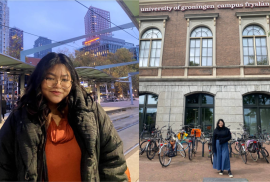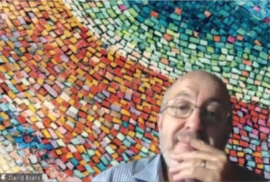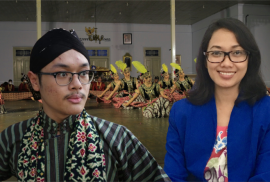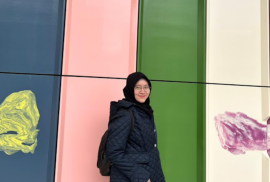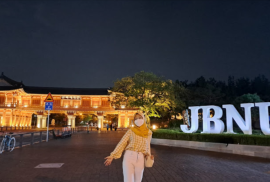For Vina, her exchange studies took place in Leeuwarden, Netherlands at the University of Groningen: Campus Fryslan. She took five courses namely Explaining Human Behaviour, Homes and Car: GRL Homes and Cars: Technologies, Citizens and the Energy Transition, Language and Culture, Psychological Perspectives on Leadership, and lastly, Diversity, Intersectionality and Global Health. All the courses were taught in English as the program also involved international students from outside of the Netherlands. She was a bit hesitant and scared when she first knew about the courses that were offered as not many were directly related to the major that she followed in UGM which is Psychology. But once the classes started, it was actually very interesting to learn some things that she would never encounter as a Psychology major. It was also exciting to be able to have many discussions about different cultures and even share about Indonesia to other students in those classes.
On Tuesday, 21 February 2023, the class of Children and Adolescents with Special Needs conducted an International Guest Lecture with Prof. David Evans from Sydney School of Education and Social Work, the University of Sydney. The main topic of the lecture is about ‘Universal Design for Learning’ which highlights the notion that various objects can be used by many people including people with disabilities with the development of universal design. According to the Centre of Excellence in Universal Design, Universal Design is where an environment has the design and composition that can be accessed, acknowledged and utilized primarily by all people regardless of their age, size, ability, or disability. The term ‘universal’ is applied since it’s capable of meeting the needs of people and beneficial for everyone.
One of IUP students/alumni, Matheus Raoul Supriyadi, did a research in the field of Cultural Psychology. The research is titled “The Psychological Aspects within The Yogyakartan Bedhaya: An Exploratory Study on Royal Court Dancers”. Raoul and his supervisor, Satwika Rahapsari, S.Psi, M.A., R-DMT, succeeded to publish their research in a reputable international journal ranked Q1. This is certainly a very remarkable and enormous achievement.
The culture of Yogyakarta is quite distinctive and unique which is capable of connecting with moral and spiritual components. In Yogyakarta, dance performances have a special stance in the royal arts. Nowadays, the society is able to watch and enjoy dance performances, including court dances regardless of their social status. Yet, several genres of dance performances are still considered sacred. One of the genres is the Bedhaya. The research mainly tells us about their exploration of Bedhaya dancers in the Yogyakarta royal court from a cultural psychology perspective to ultimately identify what psychological aspects are involved in the formation of their experiences. The aim of this study is to explore and examine the impression of dancers throughout the process of learning and performing the Bedhaya. After being exposed to various information and knowledge about the Bedhaya, they also want to identify the psychological aspects that can be acquired from the process of art performance. They interviewed several Bedhaya dancers from various generations to collect the data. From this research, they are able to generate five themes of the essence of Bedhaya dancers’ experience.
Kiki went to the University of Warwick and took four modules from the Psychology Faculty: Language and Cognition, Non-Verbal, Psychology and Law, and Negotiation and Influence. She was really enthusiastic but a bit scared at the same time because many of her classes have a lot of reading lists. She felt amazed at how engaging the lessons are despite being a big class. At first, catching up with the study pace was also hard. The learning activities consist of seminars that discuss the readings for the week, video workshops where we watch videos and analyze the gesture and non-verbal from it. Negotiation roleplay, weekly assignments, quizzes, and watching documentaries in the psychology and law class. There are big differences between learning in Warwick and UGM, last semester, UGM classes were still mixed between online and offline classes. Meanwhile, the University of Warwick is entirely offline. Therefore, the classes feel more lively and engaging. Other than that, UGM classes are more generic and usually give the students book references to read so the students are capable of understanding the material better. University of Warwick classes teach more specific topics and give many journal articles as references. But this might be because most of the lessons she has taken in UGM are mandatory. As for Warwick’s, it was elective. In Warwick, they rarely give homework or assignments. Even when they did, it did not take much time, and she could finish it in one sitting.
Caca did her exchange program at Jeonbuk National University (JBNU) in Jeonju, South Korea. She took five courses that were all taught in English: International Ethics and Social Justice, Introduction to Cultural Anthropology, Practical English, Social, Economic, and Environmental Sustainability, as well as Understanding British and American Culture. None of the courses are directly related to her major, which is Psychology, because all courses offered by the Psychology Department are conducted in Korean. It was challenging since the classes are very different from one another. There were big classes with students from very different backgrounds, and there was also a small class with students from very similar backgrounds where all of them even have the same religion. But still, many of them were raised in different cultures, so sometimes she heard brave and controversial opinions which shocked her. Aside from the learning environment, as a whole experience, she really wanted to go back home. It was super difficult to manage everything on her own and she got very homesick during her first week there. She was sick in quarantine so she just video-called her family and cried all day.

